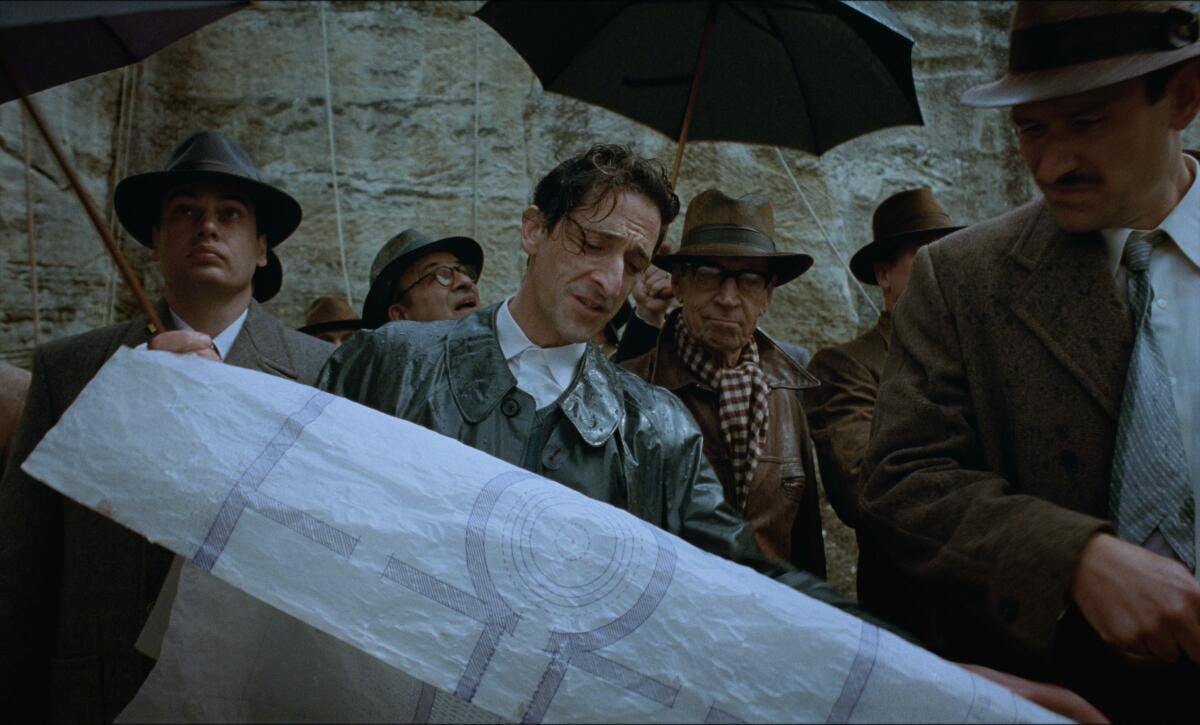
In one of the opening shots of The Brutalist, the Statue of Liberty looms over a boat of immigrants arriving at Ellis Island, the skewed angle by which Hungarian-Jewish architect László Tóth (Adrien Brody) views it making the iconic statue appear upside down. It holds all the majesty and awe that American immigrants feel upon seeing the country’s most iconic landmark, but something is slightly off — literally askew. It’s a fitting introduction to director Brady Corbet’s towering post-World War II historical drama about the hollow nature of the American Dream, and the devastating sacrifices made in pursuit of it.
“It's really [about] the paradox of the immigrant struggle,” Adrien Brody tells Inverse. “And how incongruous the American Dream is with the hopes and dreams of the vast majority of people that flee hardship and oppression, that come to this great nation in hopes of assimilating and being welcomed as Americans, and yet are not.”
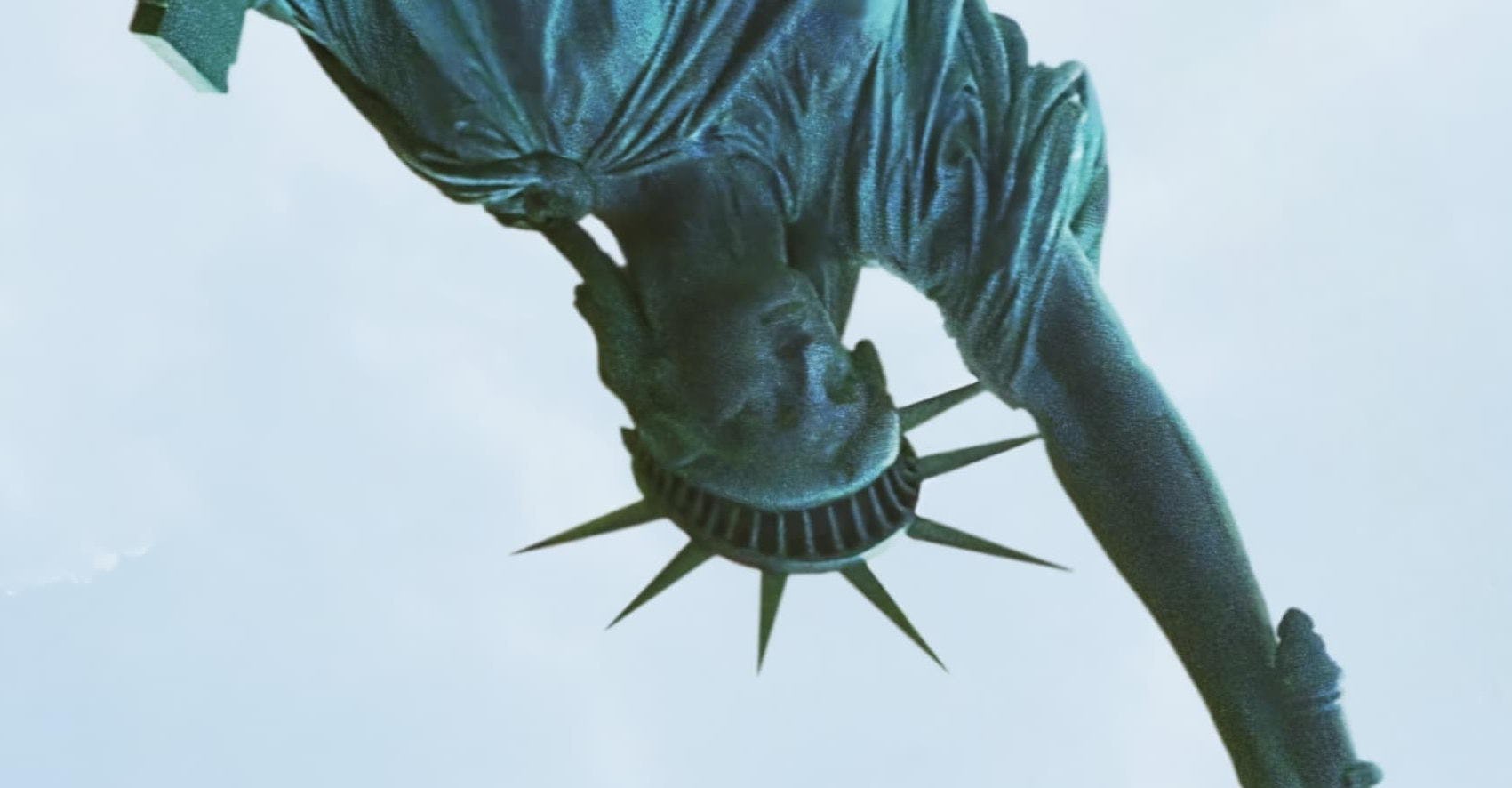
As László, Brody gives the performance of his career — looking perpetually gaunt and hungry, but with a glint of steel in his eyes, a hint of this ambitious architect’s stubborn pursuit of perfection. It feels like a performance that Brody has been working toward his whole career — a role that synthesizes the real-life inspiration from his mother, a Hungarian immigrant whose memories of fleeing war and carving out a career as an artist in America proved “invaluable” to Brody, and his first Oscar-winning role in The Pianist, in which Brody played real life Jewish pianist and Holocaust survivor Władysław Szpilman. At the very least, the two roles feel like they’re in conversation with each other — a shared DNA that I point out to Brody in an interview with him ahead of the release of The Brutalist.
“I think all of our work in life is in conversation.”
“I think all of our work in life is in conversation,” Brody tells Inverse. He adds, “I think I've gained a very unique understanding of the horrors of World War II, and to the levels of suffering and loss and starvation that were helpful for me to portray Szpilman in The Pianist. And I think that alone has given me great context for the backstory of László.”
A Brutal Road to Production
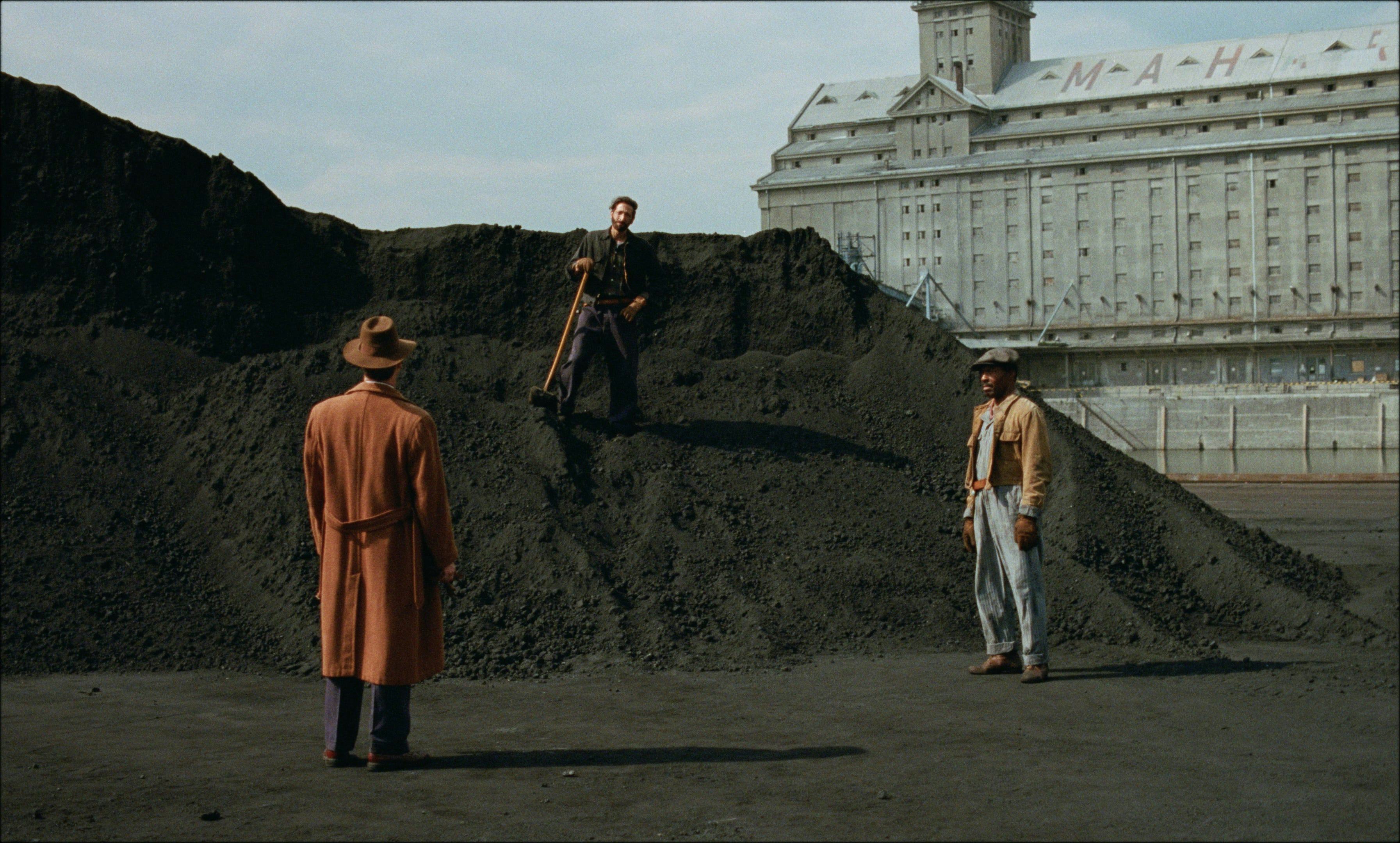
Despite The Brutalist feeling like a role that was made for Brody, he wasn’t even the first choice that director Brady Corbet had. In fact, six years ago, when Corbet was first developing The Brutalist with co-writer and partner Mona Fastvold, the entire cast might’ve looked entirely different. Instead of Brody, Felicity Jones as László’s wife Erzsébet, and Guy Pearce as eccentric millionaire Harrison Lee Van Buren, The Brutalist would’ve starred Joel Edgerton, Marion Cotillard, and Mark Rylance in their respective roles. But sometime during COVID, the original cast fell through and the film was fully recast. But that gave Brody, Jones, and Pearce a relatively short time to prepare for the historical epic.
“It was probably about six months before we shot it [when I came on board],” Guy Pearce tells Inverse. But that prep time was no problem for Pearce: “It was just a matter of reading [the script] a few times and discussing more with Brady about just making sure I understood what it was he wanted.”
“What a role for an actor.”
Jones, who Pearce notes was cast in the film before him, acknowledges that “the film was definitely quite a battle to get made.” But she also credits Corbet for helping the cast settle into their roles almost immediately.
“We all came on at different points, but the consistent element was that Brady just talked us through, from the very beginning, how he saw it,” Jones says. “He just made it so easy for us. And he's an actor himself, so he knows about vulnerability. So he allowed you to be quite vulnerable on set and to try things out. But at the same time, I think he had such a strong idea of what he wanted. And intuitively, you pick up on that. You felt like it was a very benign dictatorship.”
For Brody, a short prep time was no issue: he had been dreaming of being cast in the film since he read the script more than five and a half years ago.
“It's a really beautifully crafted script. It's a vast script, obviously, to tell a story with so much nuance and complexity and feeling,” Brody says. “What a role for an actor. When I read it, I just was really praying that the stars would align and that they would cast me in it.”
Leaving a Legacy
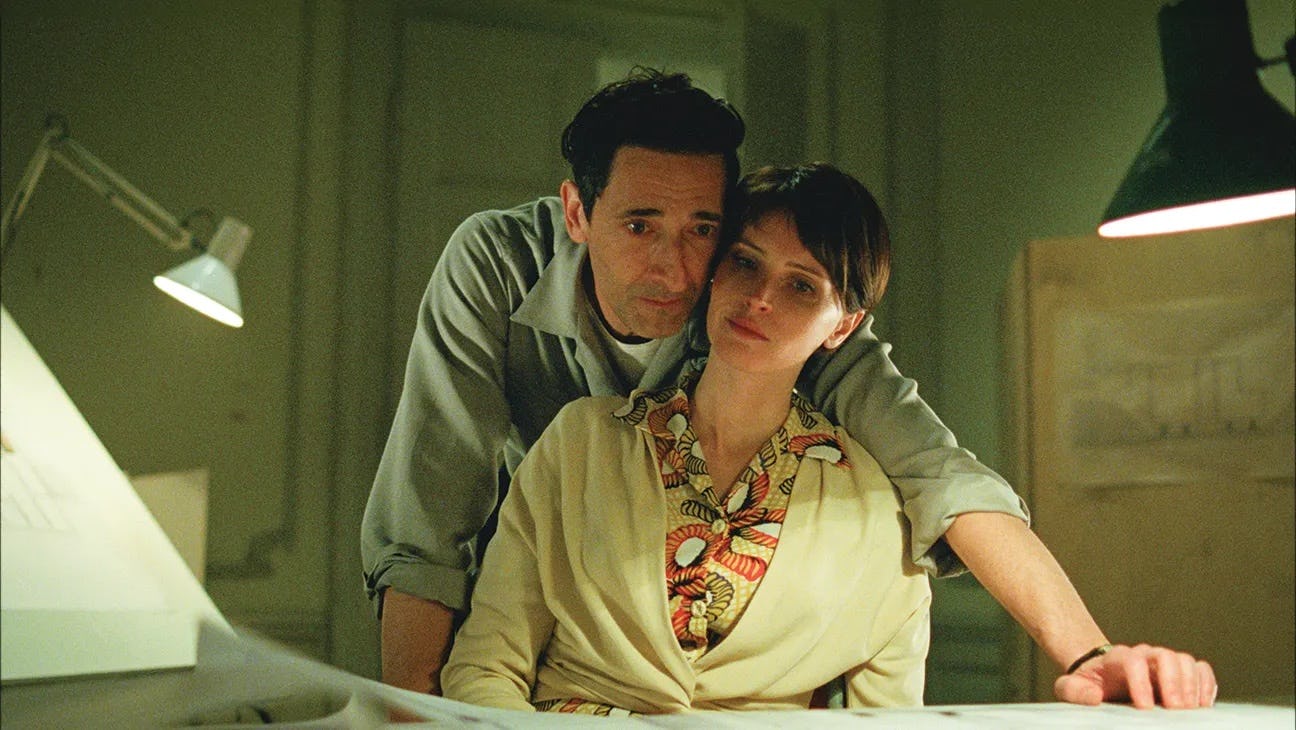
Warning: Spoilers for The Brutalist follow.
Complex and nuanced doesn’t begin to scratch the surface of the impossibly dense tapestry that is The Brutalist. Though the film is centered around László — charting his journey from the shores of Ellis Island, to the slums of Philadelphia, to finally being under the employ of Pearce’s wealthy industrialist, Van Buren — the film is peopled by complicated characters who probe at the idea of the American dream and highlight the intense class differences embedded in the country. Jones’ Erzsébet, who gets reunited with László after being separated and reported dead in Budapest, becomes a particularly powerful force — both on László’s behalf, and against him.
“With someone like Erzsébet, she’s so defiant, and she's almost quite confrontational and quite edgy,” Jones says. “She doesn't make things straightforward and simple and easy, and I just really felt I could do something with the role.”
“I felt I was able to apply the connection as an artist and the yearnings as an artist of leaving something behind.”
Jones singles out Erzsébet’s hostile dynamic with Van Buren — which escalates into an intense clash in which Erzsébet confronts Van Buren for raping László — as an example of how the two embody the main conflict of this film: Who holds the power? “From the very beginning, there's a real power struggle between the two of them,” Jones says. “These [are] two characters who both want the power.”
This climactic confrontation brings the film to its most ambiguous, thought-provoking, moment: The fate of Van Buren, who mysteriously disappears after Erzsébet’s violent accusation is made in front of his children and his benefactors. It’s one of the most striking cinematic moments of the year, but it’s one that Pearce thinks is important to leave a mystery.
“I've made the decision to not express what I think might've happened to him,” Pearce says. “I think what's important is actually that it is a mystery. Because on some level, him just being gone and being reduced to nothing in the story anymore is actually really valuable.”
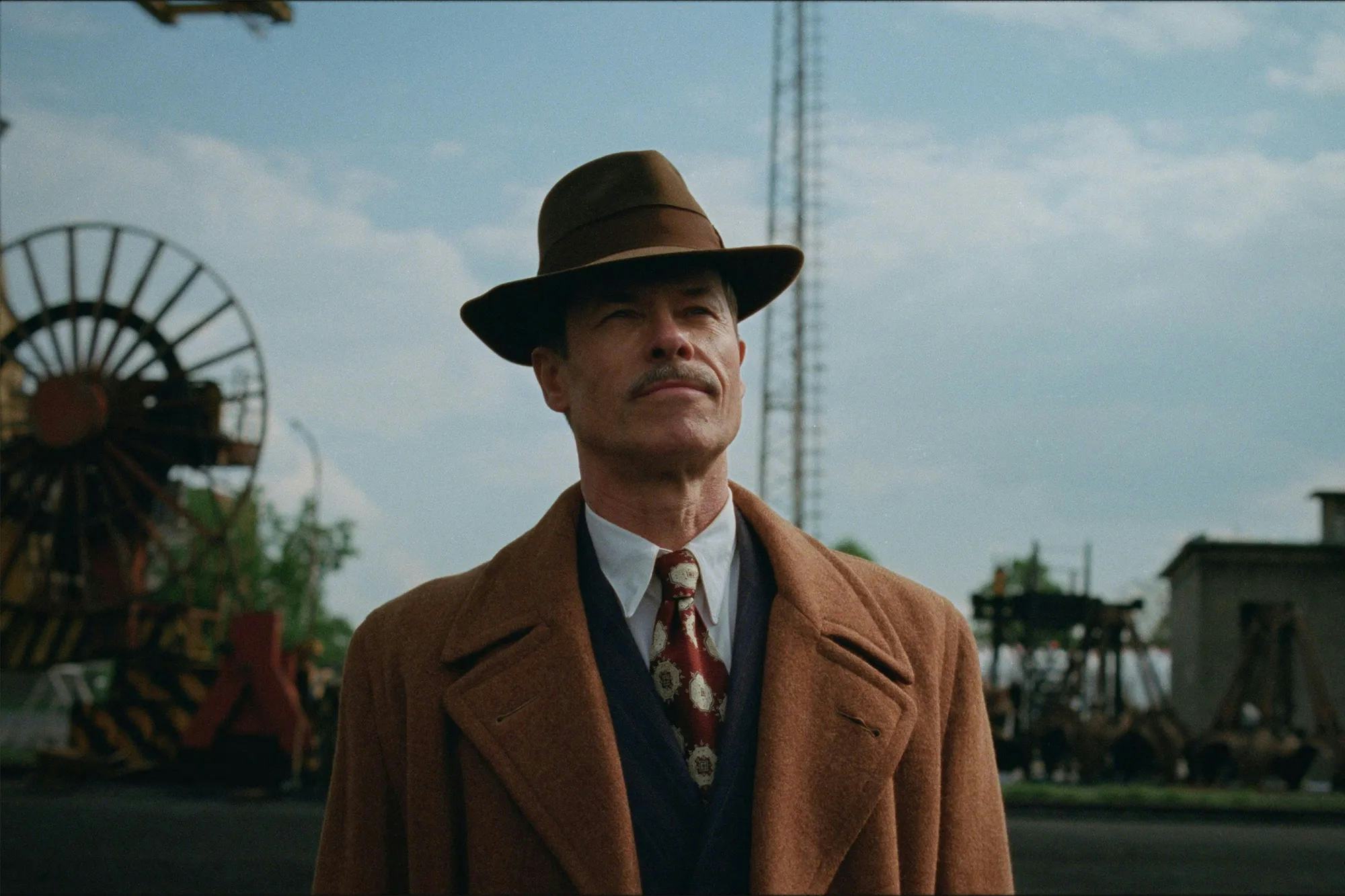
If you can boil the rich messages within The Brutalist down, you come to a meditation about legacy: legacy. The legacy that we leave behind, whether it exists in great architectural monuments, or in the mystery of a formerly great man’s disappearance. For Brody, that was what he connected to with The Brutalist.
“I felt I was able to apply the connection as an artist and the yearnings as an artist of leaving something behind,” Brody says. “[It was] something I was very connected to, and something I was very grateful to have an opportunity to share.”







